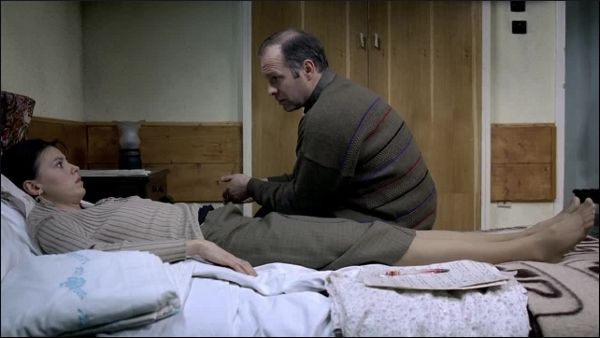One Romanian movie that managed to attract a lot of attention and win the Palme d'Or at the Cannes Film Festival in 2007 is 4 luni, 3 saptamani si 2 zile (4 months, 3 weeks, and 2 days). While it had quite a low budget, it still managed to impress, which says plenty about director Cristian Mungiu. It was highly praised for its depiction of what pregnant women had to go through to get an abortion during the Communist regime in Romania. While it does not represent every woman’s experience with abortions, it still remains a perfectly realistic scenario.
The film takes place in 1987, and while there is no mention of the city, by the name of the locations and the university the girls go to, it is safe to assume the action takes place in Bucharest, capital city of Romania. Some of these locations are more accurate than others. The hostel where the two girls live –Otilia, played by Anamaria Marinca, and Gabita, played by Laura Vasiliu – is a very good depiction of the lifestyle Romanian students experience. On the other hand, the street scenes seem quite bland compared to how real-life Bucharest streets look like, mostly because they are so empty and look as if a war had taken place there. This may be attributed to the low budget, but the truth is that Mungiu exaggerated the poorness of Romania in order to maximize the dramatic impact, which is not a fair thing to do.
"While it does not represent every woman’s experience with abortions, it still remains a perfectly realistic scenario."
The soundtrack is mostly non-existent, which is a shame, because the movie lacks action. There are a few scenes that are downright boring and could have really benefited from a proper background melody to improve the atmosphere. This conveys a persisting feeling of emptiness, which some may argue works in favor of the movie, but actually just bores most of the audience because it does a poor job of holding its attention.

As far as the acting goes, it is mostly very good. The lack of emotion in some scenes is not the fault of the actors, but the director’s mistake coupled with the lack of ambient music. Actually, Anamaria Marinica’s performance is very good throughout, and Vlad Ivanov is downright impressive in his portrayal of the doctor who performs the abortion. The language spoken by the characters has a regional influence from the southern part of Romania, and it is considered that people from this area speak the most correct Romanian in the country. Of course, this assumption is not quite right. Muntenii (the mountain people), as they like to call themselves, employ slang and intentional grammar and spelling errors, like an excessive use of the vowel “ă” (“pă” or “dă” instead of “pe” or “de”) or saying “decât” (“except” or “but”) instead of “numai.” And, last but not least, they swear a lot.
"4 luni, 3 saptamani si 2 zile is good, though it could have been better. But it remains a must-see if you prefer intelligent movies."
The characters do not wear their emotions on their sleeve, and a certain degree of empathy is necessary to understand them. While the doctor is usually considered a downright evil man, this is quite far from the truth. A much better way to describe him would be to call him a perverted, broken opportunist, who is very skilled in the art of persuasion and always frames his actions as a favor to the girls rather than as a paid service. Gabita, the girl receiving the abortion, is just a silly girl. She is completely dependent on her good friend Otilia, who is the most interesting character in the movie. Otilia understands the world around her, but she is overwhelmed by the feeling that she has to face all her problems – as well as those of others – completely alone. This is mostly visible at the end of the movie, in her conversation with her boyfriend, who is a good example of the average, egotistical person.
4 luni, 3 saptamani si 2 zile is good, though it could have been better. But it remains a must-see if you prefer intelligent movies.




